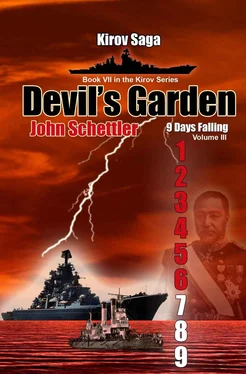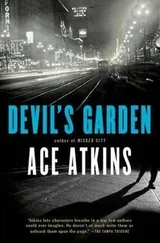John Schettler - Devil's Garden
Здесь есть возможность читать онлайн «John Schettler - Devil's Garden» весь текст электронной книги совершенно бесплатно (целиком полную версию без сокращений). В некоторых случаях можно слушать аудио, скачать через торрент в формате fb2 и присутствует краткое содержание. Жанр: Альтернативная история, на английском языке. Описание произведения, (предисловие) а так же отзывы посетителей доступны на портале библиотеки ЛибКат.
- Название:Devil's Garden
- Автор:
- Жанр:
- Год:неизвестен
- ISBN:нет данных
- Рейтинг книги:3 / 5. Голосов: 1
-
Избранное:Добавить в избранное
- Отзывы:
-
Ваша оценка:
- 60
- 1
- 2
- 3
- 4
- 5
Devil's Garden: краткое содержание, описание и аннотация
Предлагаем к чтению аннотацию, описание, краткое содержание или предисловие (зависит от того, что написал сам автор книги «Devil's Garden»). Если вы не нашли необходимую информацию о книге — напишите в комментариях, мы постараемся отыскать её.
Devil's Garden — читать онлайн бесплатно полную книгу (весь текст) целиком
Ниже представлен текст книги, разбитый по страницам. Система сохранения места последней прочитанной страницы, позволяет с удобством читать онлайн бесплатно книгу «Devil's Garden», без необходимости каждый раз заново искать на чём Вы остановились. Поставьте закладку, и сможете в любой момент перейти на страницу, на которой закончили чтение.
Интервал:
Закладка:
The Japanese trainees were also in the UK awaiting the completion of several battleships they had commissioned. In 1878 Togo was assigned to one of these for the voyage home to Japan. He sailed in Hiei , along with Fuso and Kongo. These were not the ships of the same name that fought in WWII, but their forerunners from the pre-dreadnaught era, the first real fighting ships of the Japanese Imperial Navy. They were actually no more than armored corvettes, using a combination of both sail and steam power for propulsion at a sedate 14 knots and displacing no more than 3,700 tons. By 1908 they had already been retired and decommissioned.
China had built bigger ships by the time Togo sailed home, and an arms race was soon underway that saw Japan enlisting the aid of France to build a fleet of armored cruisers, and the British for the design and construction of a new idea, the torpedo boat, which became the forerunner of the destroyer class ships of the future. These Kotakas , or ‘falcons’ of the sea would play a big role in Japan’s victories over China between 1894 and 1895, and over Russia in the Russo-Japanese war of 1904-05. At nearly 30 knots, the small 150 ton boats carried 14 inch torpedoes that would become the bane of the Russian fleet.
Yet the English also gave Togo a sense of what the world was really like beyond Japan, even allowing him to partake in a voyage to circumnavigate the globe aboard the training ship Hampshire in 1875. He contracted a disease on that voyage which nearly took his eyesight and would have ended his career, but pulled through to regain his health after much hardship. And Togo put those eyes to very good use, learning much by studying the operations of the British and French at sea, and the French Army when it fought the Chinese in Formosa.
In Japan’s war with China in 1894 the young man, then a Captain aboard the cruiser Naniwa , demonstrated an uncanny ability to navigate the treacherous waters of international relations when he sunk a British freighter chartered by the Chinese to carry supplies. The incident might have brought Great Britain into the war on China’s side, but jurists ruled that the sinking was entirely appropriate under the rules of international law and regulations of war. Chinese soldiers carried by the ship had taken control of the vessels when threatened by Togo’s ship, and so they became legitimate prizes of war.
Togo’s star rose and he was soon promoted to Rear Admiral and commander of the Japanese Naval War College. When war with Russia called him to action again in 1904 Japan had much more of a navy to rise to the challenge. The Japanese Navy Minister personally requested that Admiral Togo be appointed Commander-In-Chief of the Combined Fleet, and it was the wisest appointment the Emperor ever made.
Thought to be a ‘man of good fortune,’ Togo’s luck and considerable skill saw him achieve a stunning and decisive victory over Russia. He handily defeated their First Pacific Squadron, investing Port Arthur, besting them in the Yellow Sea and bottling up their armored cruisers in Vladivostok. When the Russians sent their entire Baltic Fleet to restore order, Togo soundly defeated them at the famous battle of Tsushima Strait. He was a legend by 1908, his name nearly synonymous with the Japanese Imperial Fleet he so ably served.
Togo’s victory at Tsushima sent real shockwaves around the world and hastened the demise of the last Tsar of Russia. While that nation was soon descending into the turmoil of revolution, Japan consolidated her position as the rising preeminent power in the Pacific. All history had pivoted on that single battle, which would eventually lead Japan into conflict against the Chinese, and then the Americans in WWII. It would forever relegate Russia to the role of a third rate naval power in the Pacific, with little influence beyond the cold northern shores of the Kuriles and Sakhalin Island, and Japan had even taken half of that from them in exchange for peace.
The American President in 1908, Teddy Roosevelt, had helped to broker that peace at Portsmouth to end Japan’s war with Russia, but he soon realized that Japan was now a force to be reckoned with in Asia and the Pacific. As much to demonstrate America’s ability to move from one ocean to another, Roosevelt secured funds to have the entire US Navy battle fleet circumnavigate the globe in 1908, the battleships all dressed out in clean white paint.
On that day, just as the Tatsu Maru first set eyes on the massively threatening silhouette of the battlecruiser Kirov off her port bow, the “Great White Fleet” of the US Navy was approaching Hawaii, 16 battleships and other auxiliaries preparing to make a brief port of call there and continue across the Pacific with planned stops in the Philippines, New Zealand, Australia and eventually Japan.
Roosevelt would show Japan the entire might of the US Navy, and perhaps smooth out the way for better relations with in the days ahead. It was a clear application of one of his favorite maxims-to ‘speak softly and carry a big stick.’ But the Great White Fleet was soon to find much more than a long and arduous sea voyage as it continued west, just as Admiral Togo was soon to find that the fires of war with Russia were not yet fully extinguished.
A new enemy was coming at Japan from the sea to throw down the gauntlet of challenge. Another man of war was on the scene now, in a ship unlike any other in the world. Karpov’s shot across the bow of the Tatsu Maru was indeed the opening round of a new war, and one that would change the fate of all nations with interests in the Pacific for centuries to come.
Chapter 23
Thesound of the distant horn call seemed to have an urgent edge to it. Heihachiro Togo stopped, listening closely as he tied off the brace of pheasant he had been hunting, binding their legs with a small twine. He looked to see a rider approaching, hastening up the hill as though pursued by demons. This man is coming to find me, he knew. Something must have happened. But what?
Togo was a man of quiet resolve, and one who rose to a position of great authority after years of routine and diligent work in the Japanese Navy. A strange feeling of alarm rose in him as he watch the rider come, but he stilled his mind, imposing calm and order on his thinking.
His given name meant “Peaceful son,” and his surname “Togo” referred to the nation of the east. Thus this “peaceful man of the east” was the Yin force at the heart of Japan’s energetic Yang when it came to war. He was once heard to remark that “peace has its victories too, and more renowned than those of war.” In fact, the Admiral’s own biography, to be written in 1909, would be entitled “Benevolence and Peace.” Yet when it did come time to engage in battle, he did so with a single minded belief in the attainment of victory.
A simple man, he took pleasure in the simple things of life, loving his family, nature, hunting with his dogs, or work in his beloved garden. In spite of his notoriety and fame, he shunned pomp and ceremony, sought no medals or fanfare, and carried out his work with assiduous attention, seeing to everything in his charge yet not interfering in the work of others. To some it seemed he accomplished all his work with a seemingly effortless efficiency, yet no man in the navy worked harder.
He was also a temperate man, with a level-headed disposition, and never one to indulge in strong drink to the point of intoxication. Only a clear mind could attend to all the many details his post required, and his was a mind as placid and cool as a mountain pond of melted spring snow. He was frugal, never wasting anything, yet generous to a fault. Modesty, honesty, and honor were all watchwords to live by, and he embodied them all in the conduct of his own life. In reporting to his superiors, of who there were few in the Naval Department or Imperial Palace, he always made sure to verify the information he related personally. As such, speculation never entered his mind, though he asked and answered a thousand questions each day in the course of his many duties.
Читать дальшеИнтервал:
Закладка:
Похожие книги на «Devil's Garden»
Представляем Вашему вниманию похожие книги на «Devil's Garden» списком для выбора. Мы отобрали схожую по названию и смыслу литературу в надежде предоставить читателям больше вариантов отыскать новые, интересные, ещё непрочитанные произведения.
Обсуждение, отзывы о книге «Devil's Garden» и просто собственные мнения читателей. Оставьте ваши комментарии, напишите, что Вы думаете о произведении, его смысле или главных героях. Укажите что конкретно понравилось, а что нет, и почему Вы так считаете.












